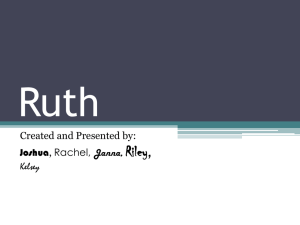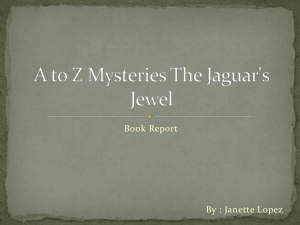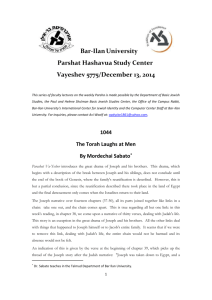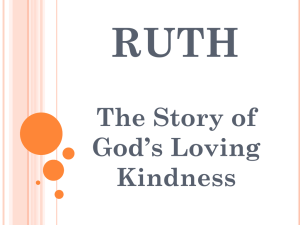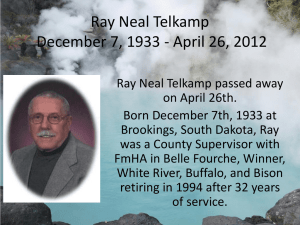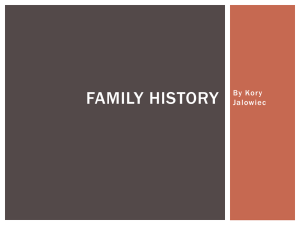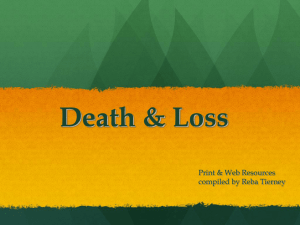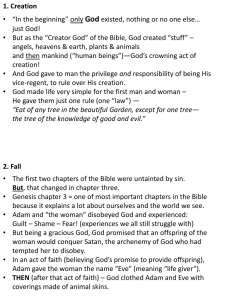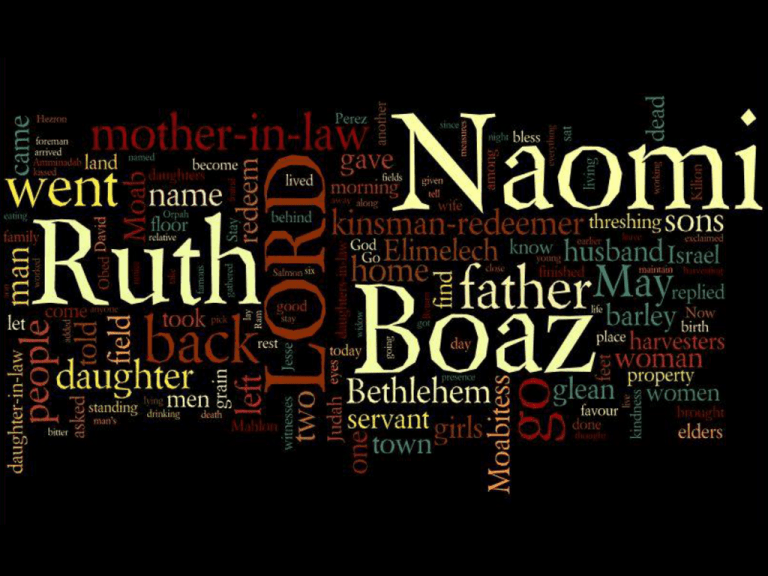
Ancient threshing floor
• The best threshing floors involved rock outcrops on hilltops
• The hard surface was needed to keep the grain free of dirt and to
facilitate sweeping up the grains at the end of the day
• The hilltop location was required to take advantage of the wind that
would blow away the chaff when the threshold grain was tossed in
the air with a fork, allowing the separated heavier kernels of grain to
fall to the floor
• In the ancient near east, threshing floors where known places of
illicit sexual behavior … realizing that the men would spend the night
in the fields next to the piles of grain, prostitutes would go out to
them and offer their services
Threshing Floor Associated with Licentiousness
• Hosea 9:1 – “Rejoice not, O Israel! Exult not like the peoples; for you have
played the whore, forsaking your God. You have loved a prostitute's wages
on all threshing floors.”
Sources:
Block, Daniel I. Judges, Ruth. The New American Commentary, 1999.
Bush, Frederick W. Ruth, Esther. Word Biblical Commentary, 1996.
Hubbard, Robert L. The Book of Ruth. New International Commentary on the Old Testament, 1988.
James, Carolyn Curtis. The Gospel of Ruth: Loving God Enough to Break the Rules. 2008.
Ulrich, Dean R. From Famine to Fullness: The Gospel According to Ruth. 2007.
Younger, K. Larson. Judges/Ruth. NIV Application Commentary, 2002.
• Beatie, D.R.G. The Targum of Ruth. 1994.
• Campbell, E. F. Ruth. Anchor Bible, 1990.
• Nielsen, K. Ruth: A Commentary. Old Testament Library, 1997.
• Trible, P. God and the Rhetoric of Sexuality. 1977.
• Botterweck, G.J. and Ringgren, H. “Threshing Floor,” Theological Dictionary of the Old Testament, 1982.
• Carmichael, C.M. “ ‘Treading’ in the Book of Ruth,” ZAW 92:248-266 (1980).
• Green, B. “The Plot of the Story of Ruth,” JSOT 23:161 (1982)
• Ryken, Leland and Longman, Tremper. “Sex,” Dictionary of Biblical Imagery. 1998.
• Sakenfeld, Katharine. “At the Threshing Floor,” Old Testament Essays, 15:164-178 (2002).
• Robertson, E. “The Plot of the Book of Ruth,” Bulletin of the John Rylands Library, 32: 207-228 (1950).
• Younger, K. Larson. “Two Comparative Notes on the Book of Ruth, Journal of Ancient Near Eastern
Society 26:121-132 (1998).
• Andersen, F.I. and Freedman, D. N. Hosea. Anchor Bible Commentary, 1996.
• Dearman, J. Andrew. The Book of Hosea. New International Commentary on the Old Testament, 2010.
• Smith, Gary V. Hosea, Amos, Micah. NIV Application Commentary, 2001.
• Stuart, Douglas. Hosea-Jonah. Word Biblical Commentary, 1987.
Additional Ruth Sources
• Anders, Max and Phillips, W. Gary. Judges, Ruth. Holman Old
Testament Commentary, 2004.
• Atkinson, David. The Wings of Refuge: The Message of Ruth,
1983.
• Crabb, Larry. Shattered Dreams: God’s Unexpected Path to
Joy. 2001.
• Keil, C.F. and Delitzch, F. Joshua, Judges, Ruth. Commentary
on the Old Testament
• Huey, F.B. Ruth. The Expositor’s Bible Commentary, 1992.
• LaCocque, Andre. Ruth. A Continental Commentary, 2004.
• Morris, Leon. Ruth. Tyndale Old Testament Commentaries,
1968.
Facing Hard Choices
• The narrator has deliberately created a scene riddled
with sexual tension
• Not to spice up the story for the sake of
sensationalism, but to drive home an important point
• Namely, that God’s people are perpetually confronted
with difficult situations and hard choices
• Will you be guided by self-interest or will hesed cause
you to set aside self-interest and freely sacrifice for
others?
• In every episode of the book of Ruth, one of more of
the central characters face that kind of decision, and
we repeatedly observe them going above and beyond
what duty, custom, and the law required
Ruth and Boaz: People of Unmatched Integrity
• What happens at the threshing floor is as essential to
the author’s purpose as what happened:
– On the Moabite highway between Ruth and Naomi
– In the harvest scene when Boaz praised an
impoverished widow who was gleaning
– In the solemn civil hearing at the city gate
• At each of these points in the story, a moment of
choice is presented to both actors and audience
• At each of these points the choice is made in favor of
what righteous living calls for
Ancient Family Laws
• In every Israelite family, two issues
were paramount: the survival of
the family name and keeping family
land in family hands
• The family of Elimelech ran into
trouble on both counts:
– Famine drove them off their land
– The deaths of Elimelech and his
two sons threatened the family
with extinction
• Mosaic law, however, carried
provisions to save a dying family
and to protect ownership of “their”
land
Theological Significance of the Land:
A Stage for Mission
• In the Bible, the land (or earth) always belonged to God
simply because He created it
• Psalm 24:1-2
“The earth is the LORD's and the fullness thereof,
the world and those who dwell therein,
for he has founded it upon the seas
and established it upon the rivers.”
• Psalm 95:5
“The sea is his, for he made it,
and his hands formed the dry land.”
Theological Significance of the Land:
A Stage for Mission
• As rightful owner, God could give land to
whomever He wished, whether for His
people or the other nations
• He promised the patriarchs all the land
encompassed by the dimensions in
Joshua 1:4
• However, God forbade the Israelites to
dispossess certain nations, including Moab,
of the territory that He had allotted for
them (Deut 2:9)
• God gave all peoples a share in His creation
“When the Most High gave to the nations their
inheritance, when he divided mankind,
he fixed the borders of the peoples according to the
number of the sons of God.”
(Deuteronomy 32:8)
God is Always the Ultimate Owner
• Neither the Israelites nor the nations ever assumed ultimate
ownership of their divinely allotted land
– YHWH gave the kings of the earth their momentary dominion and
domains and then took them away (Daniel 2:21)
– He held them accountable for whether they ruled for the good or hurt of
others (Jeremiah 22:11-17; Amos 1:6-8)
• The Israelites were aliens and tenants on YHWH’s land. Land was a
gift; a trust. As such, the land was not to be used only for personal
advancement
– God would bless Israel’s working of the land for the provision of their
needs (Deuteronomy 9:7-9; 28:8)
– But provision of needs and wants was not to consume Israel’s attention;
instead,
the land
wasthe
to besame
the stage
for ministry
… an instrument
of
• The
Israelites
faced
challenges,
hardships,
and
generosity
reversals
astoanyone
else to address felt needs of one another and
–
They were
use economics
others
with
a view tothem
gaining
opportunities
to discuss
their beliefs,
• How
they
handled
(and
those beset
by them)
would
theology and ethics
present
a marked
alternative
towould
the business-as-usual
and
– This ministerial
view
of economics
get attention of people
outside
dog-eat-dog
of humanand
commerce
of Israel and mentality
promote conversation
even conversion
• The bottom line was not supposed to be the bottom line!
The Kinsman-Redeemer (Go’el)
• The Go’el was the nearest adult male relative
• He served as an advocate for any vulnerable and/or unfortunate clan
member
• His purpose was to correct any disruption to clan wholeness, wellbeing, or peace (especially through the redemption or restoration of
property, persons, or lineage)
• He is essentially responsible for the economic well-being of a relative
and comes into play especially when the relative is in distress and
cannot get himself/herself out of the crisis
• There is no similar institution in modern Western societies, thus
there is no word in English remotely equivalent
• Go’el’s basic meaning of “redeem, buy back, recover, restore” is
derived from its use in law and custom of the Israelite clans
• While the go’el has the responsibility to perform redemption/
restoration, he was not obligated to do so
• There was an apparent hierarchy of response (Lev 25:48-49) that
indicates volition, choice, determination, etc.
• This is where the concept of hesed comes into play … the go’el must
be willing to perform redemption/restoration
Conducting Business for the Glory of God
Recognizing that life in a fallen world holds no guarantees, Lev 25:23-28
speaks of several ways that the Israelites could do business distinctly
and to the glory of God:
“The land shall not be sold in perpetuity, for the land is mine. For
you are strangers and sojourners with me. And in all the country you
possess, you shall allow a redemption of the land.
“If your brother becomes poor and sells part of his property,
then his nearest redeemer (go’el) shall come and redeem what his
brother has sold. If a man has no one to redeem it and then himself
becomes prosperous and finds sufficient means to redeem it, let him
calculate the years since he sold it and pay back the balance to the
man to whom he sold it, and then return to his property. But if he
does not have sufficient means to recover it, then what he sold shall
remain in the hand of the buyer until the year of jubilee. In the jubilee
it shall be released, and he shall return to his property.”
What
What
happens
redemptive
ifland,
there
roleaisdoes
no kinsman-redeemer?
the
(go’el)
serve
here?of the
• ByWas
selling
poor
man“kinsman-redeemer”
did
notrelation
cease
be the
rightful
owner
How
an
is his
the
Israelite
LORD
allowed
described
to in
sell
“his”toland?
to
the
land?
How
long could one suffer the loss of ancestral land?
property
How
What
are
was
the
forbidden?
Israelites
described
What
was in
herelation
really selling?
to the land?
What
the
purpose
of the Year
of Jubilee?
• Levwas
25:23
forbade
permanent
sale
of land and transfer of ownership
•• The
redemption
of property
(through
monetary
payment)
Instead,
the
debtor
would
in
essence
rent
his
land
by sellingeverybody’s
its usufruct share
or
• •This
law
reinforced
God’s
ownership
of
the
land
&
protected
This
was done
to ensure hereditary property never passes out of the clan
potential
produce
• Every fifty years, all debts were cancelled and all property returned
Hejubilee
sold future
harvests
and
these
overand
time
paid
down the
debtstart
• •The
would
wipe the
slate
clean
give
everyone
a fresh
Other Aspects of a Go’el’s Redemptive Role
• To maintain the freedom of individuals within the clan by buying
back those who have sold themselves into slavery to a resident
alien or another Israelite because of poverty (Lev 27:47-55)
• To act as the blood redeemer; to track down, avenge and
execute murderers of near relatives, hence restoring clan
wholeness (Num 35:12, 19-27; Duet 19:6, 12; Josh 20:2-3, 5, 9)
• To receive restitution money on behalf of a deceased clan
relative who was a victim of a crime, hence restoring clan
wholeness (Num 5:8)
• To ensure that justice is served in a lawsuit involving a relative
(Job 19:25; Ps 119:154; Prov 23:11; Jer 50:34; Lam 3:58) – note
that the Lord is the go’el in some of these passages
• To redeem the wife of the deceased (i.e, acquire legal right) in
order to “raise up the name of the deceased upon his property”
by acquiring “the wife of the deceased” (Deut 25:5-10). This
restores clan wholeness
• To redeem or restore a clan widow facing old age alone without
anyone to care for her (Ruth 4:14-15)
Levirate Marriage
• An ancient Israelite custom by which the nearest unmarried
relative of a man who died without progeny would marry his
widow and preserve the family by fathering a child on his
behalf
• The “levirate” derives from the Latin levir, “brother-in-law;”
it has nothing to do with Levi or Levitical
• By definition a levirate marriage represents a legally
sanctioned union between a yebama, a widow whose
husband has died without fathering any offspring, and a
yabam, the brother of the deceased.
• Levirate marriage is found in three passages:
– Deut 25:5-10 is the defining text regarding the legal custom of
levirate marriage in Israel
– Gen 38 (Judah and Tamar) is the first account found in the Bible
– Ruth 4 (Boaz and Ruth)
Deuteronomy 25:5-10
5“If
brothers dwell together, and one of them dies and has no son, the
wife of the dead man shall not be married outside the family to a stranger.
Her husband's brother shall go in to her and take her as his wife and
perform the duty of a husband's brother to her. 6And the first son whom
she bears shall succeed to the name of his dead brother, that his name may
not be blotted out of Israel. 7And if the man does not wish to take his
brother's wife, then his brother's wife shall go up to the gate to the elders
and say, ‘My husband's brother refuses to perpetuate his brother's name in
Israel; he will not perform the duty of a husband's brother to me.’ 8Then
the elders of his city shall call him and speak to him, and if he persists,
saying, ‘I do not wish to take her,’ 9then his brother's wife shall go up to
him in the presence of the elders and pull his sandal off his foot and spit in
his face. And she shall answer and say, ‘So shall it be done to the man who
does not build up his brother's house.’ 10And the name of his house shall be
called in Israel, ‘The house of him who had his sandal pulled off.’
A
ritewas
of refusal
took
when
an Israelite
man declined to perform his levirate
Who
required
to place
fulfill
the
levirate
law?who
Why was
it
imperative
for an
Israelite
man
died childless to be provided with a son
obligation.
This
is described
in verses
7-10.
What
do
the
words
“if
brothers
dwell
together”
in verse 5 mean?
through the levirate law?
•What
Who
initiated
refusal
ceremony
andstatus
why?of the widow?
does
versethe
5 tell
us about
the legal
• Where did the ceremony take place and why?
• What did the widow do to the levir who refused to fulfill his duty?
• How did the refusal ceremony protect the rights of the widow?
• What from the refusal ceremony shows that the levirate duty was considered an act
of love and not of compulsion?
Judah and Tamar (Genesis 38:1-11)
It happened at that time that Judah went down from his brothers and turned
aside to a certain Adullamite, whose name was Hirah. There Judah saw the
daughter of a certain Canaanite whose name was Shua. He took her and went in to
her, and she conceived and bore a son, and he called his name Er. She conceived
again and bore a son, and she called his name Onan. Yet again she bore a son, and
she called his name Shelah. Judah was in Chezib when she bore him.
And Judah took a wife for Er his firstborn, and her name was Tamar. But Er,
Judah's firstborn, was wicked in the sight of the LORD, and the LORD put him to
death. Then Judah said to Onan, “Go in to your brother's wife and perform the duty
of a brother-in-law to her, and raise up offspring for your brother.” But Onan knew
that the offspring would not be his. So whenever he went in to his brother's wife he
would waste the semen on the ground, so as not to give offspring to his brother.
And what he did was wicked in the sight of the LORD, and he put him to death also.
Then Judah said to Tamar his daughter-in-law, “Remain a widow in your father's
house, till Shelah my son grows up”—for he feared that he would die, like his
brothers. So Tamar went and remained in her father's house.
What
to Onan?
• Hadhappened
Onan refused
outright, he would have gained nothing, since either his father or
younger brother could have performed the levirate and thus produced an heir to Er
Consider Judah’s reaction to the deaths of his two oldest sons.
• Moreover, asWhy
the firstborn,
Er was
entitled
to a double share, as would be his
did theto
LORD
putTamar?
Er to death?
• What did Judah promise
do for
fictional son,What
so Onan’s
potential
loss was
even
greater
didpromise?
Judah
tell Onan
to do
after
Er’s death?
• Why did he break
his
• Thus, Onan devised
subterfuge
ortotrick.
He
had had
intercourse with Tamar but made
Why
dida Onan
refuse
doatasthis
Judah
• What does this
indicate
about
his faith
time? instructed?
sure that he did not impregnate her. By doing this (i.e., performing the duty in form
What
Tamar’s
status
at the
end for
of verse
11?his dead brother’s inheritance (along
but was
not in
fact), he
hoped
to gain
himself
Why
from
point
of view
was her situation
impossible
one to endure?
with
his her
own).
Greed
for property
was thusan
Onan’s
motivation.
Judah and Tamar (Genesis 38:12-19)
In the course of time the wife of Judah, Shua's daughter, died. When
Judah was comforted, he went up to Timnah to his sheepshearers, he and
his friend Hirah the Adullamite. And when Tamar was told, “Your fatherin-law is going up to Timnah to shear his sheep,” she took off her widow's
garments and covered herself with a veil, wrapping herself up, and sat at
the entrance to Enaim, which is on the road to Timnah. For she saw that
Shelah was grown up, and she had not been given to him in marriage.
When Judah saw her, he thought she was a prostitute, for she had
covered her face. He turned to her at the roadside and said, “Come, let me
come in to you,” for he did not know that she was his daughter-in-law.
She said, “What will you give me, that
you may come in to me?” He answered,
“I will send you a young goat from the
flock.” And she said, “If you give me a
pledge, until you send it—” He said,
“What pledge shall I give you?” She replied,
“Your signet and your cord and your staff
that is in your hand.” So he gave them to
her and went in to her, and she conceived • What did Tamar do when she
realized that Judah did not intend
by him. Then she arose and went away,
to keep his promise to her?
and taking off her veil she put on the
• What do Tamar’s actions reveal
garments of her widowhood.
about her?
Judah and Tamar (Genesis 38:20-30)
When Judah sent the young goat by his friend the Adullamite to take back
the pledge from the woman's hand, he did not find her. And he asked the men of the
place, “Where is the cult prostitute who was at Enaim at the roadside?” And they
said, “No cult prostitute has been here.” So he returned to Judah and said, “I have not
found her. Also, the men of the place said, ‘No cult prostitute has been here.’” And
Judah replied, “Let her keep the things as her own, or we shall be laughed at. You
see, I sent this young goat, and you did not find her.”
About three months later Judah was told, “Tamar your daughter-in-law has
been immoral. Moreover, she is pregnant by immorality.” And Judah said, “Bring her
out, and let her be burned.” As she was being brought out, she sent word to her
father-in-law, “By the man to whom these belong, I am pregnant.” And she said,
“Please identify whose these are, the signet and the cord and the staff.” Then Judah
identified them and said, “She is more righteous than I, since I did not give her to my
son Shelah.” And he did not know her again.
When the time of her labor came, there were twins in her womb. And when
she was in labor, one put out a hand, and the midwife took and tied a scarlet thread
on his hand, saying, “This one came out first.” But as he drew back his hand, behold,
his brother came out. And she said, “What a breach you have made for yourself!”
Therefore his name was called Perez. Afterward his brother came out with the scarlet
thread on his hand, and his name was called Zerah.
What did Judah mean by his words in verse 26, “She is more righteous than I …?
Judah’s son Perez became the ancestor of the most powerful and influential clan of the
tribe of Judah. David and all the kings of Judah were members of this clan.
What does this reveal about the way God works?
Summary
• The levirate law addressed the situation where a man
died without an heir
– Under this law, his brother was required to marry and
impregnate his widow
– The son born from this union would carry forward the line of
the deceased; as an added benefit, the widow would be
sheltered
– This was the duty of a brother-in-law, and great shame and
dishonor fell on the man who refused to fulfill this family
obligation
• The kinsman-redeemer law focused on the land and
encompassed a wider range of relatives
– When a man fell onto hard times and was forced to sell his
land, his nearest relative (or kinsman-redeemer) was called
to step in and purchase the land (or buy it back from an
outsider)
– This was done to keep his relative’s property from coming
under the ownership of someone outside their tribe
Gospel of the Old Testament
Both laws were costly and involved enormous sacrifice
Levirate Implications
• Since a father’s estate was divided among his sons, when one
son died childless, the surviving brothers’ inheritance
automatically increased
• The family pie was sliced into fewer (and therefore larger)
pieces
• The levir whose duty it was to marry the widow was spoiling
his own inheritance if he succeeded in fathering a son by her
• The newborn would replace his deceased brother – and
those lovely larger pieces of pie would shrink in size again
because now there was one more heir to include in dividing
family property
According to these calculations, becoming your brother’s
keeper is a losing proposition
But it is the hesed-way of doing things
Gospel of the Old Testament
Both laws were costly and involved enormous sacrifice
Kinsman-Redeemer Implications
• The kinsman-redeemer faced a similar conflict of interest, for
rescuing his relatives’ property involved the outlay of large
sums of money
• The price of a field was calculated by the number of harvests
until the Year of Jubilee – a national celebration every 50
years where the land would automatically revert to the
original owner
• So a man could be paying for one year’s harvest or fifty,
depending on where they were on the nation’s calendar
• In the process of redeeming his relative’s land, the kinsmanredeemer was siphoning off financial resources from his own
estate, so his sons would inherit less
The law wasn’t simply a legal code, but a heart-piercing call
to a higher way of living
It was a call to sacrifice; it is the gospel in the OT


